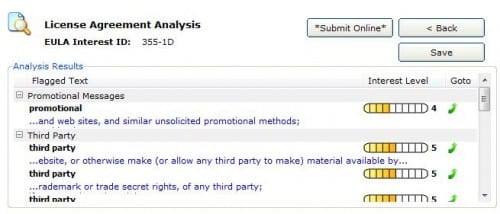EULAlyzer: Making Sense of License Agreements

The “average” article on Plagiarism Today is between 800 and 1,200 words. While they are certainly longer articles for blogs, they have nothing on the license agreements for many of the most popular services.
YouTube’s Terms of Service has a whopping 4,076 words. Facebook’s has 3,839. Even WordPress.com’s has some 2,924 words, though that includes the “gist” section that summarizes the terms.
Reading through these license agreements can be a major pain, especially considering that they are written almost exclusively in legalese and much of the content is just stock. Separating what is important and unique from what is in every agreement can be very difficult, even for attorneys.
However, an application called EULAlyzer claims it can help. Though it is aimed more at helping you make sense of the license agreements you have to sign when installing software, it can work on any license agreement by drawing your attention to areas that you may want to read more closely.
But does it work? I decided to put it to the test.
How it Works
The idea of EULAlyzer is that you take the agreement, copy it into the program and let it scan it for words that it considers interesting. You can then jump to the relevant passages in the agreement and read them more closely, without worrying about the less interesting parts.

This can, supposedly, save you time when trying to look through a license agreement, or any agreement for that matter, and better understand the most important elements.
All in all, the app is pretty straight-forward though the app does have a pro version for $19.95 that automatically scans EULA’s of any software you install, similar to an antivirus but for license agreements and one that only warns you of issues, leaving the final decision up to you.
All in all though, EULAlyzer doesn’t do anything that you can’t do with the find feature on your computer, but it has knowledge of what to look for built in and that, in turn, can be very helpful, especially to a layperson, when deciding what to look closer at.
However, for the purpose of this test, we’re taking EULAlyzer out of its element, software licenses, and instead looking at it the terms of use for various Web sites, namely YouTube, Facebook and WordPress.com.
The Tests
The first test I did with EULAlyzer looked at the terms of use for YouTube. EULAlyzer found four keywords of interesting including “Advertising”, “Third Party”, “Web Site Address” and “Without Notice”.
The advertising warnings were fairly mundane, all being mentions of YouTube’s well-known advertising program. The third party warnings were more interesting, alerting to how YouTube is protecting itself from the action of third parties and linking to them, but once again not interesting. The website address links were more dull, just linking to other TOS-related pages but the without notice links were extremely useful as it alerted me to changes that can be made without disclosure to me, including changes to the terms themselves.
While this was helpful, there was no mention of licensing or YouTube’s rights over content uploaded at all. Needless to say, this isn’t an issue routinely encountered with software but is a major deal with Web services.
My test with Facebook met with similar results. It identified three worrisome keywords, “Advertising”, “Promotional Messages” and “Third Party” though all three were fairly mundane, though the “Advertising” section did draw attention to Facebook’s privacy settings, an issue they have struggled with. Once again though, no mention of licensing or how your content will be used nor any word on termination of the agreement.
Finally, WordPress.com produces the same keyword matches as YouTube but with significantly fewer results under each match and none of them particularly worrisome. Once again though, no mention of licensing your content or termination of the agreemeent.
The Results
Though I found EULAlyzer helpful with YouTube and Facebook, it didn’t cover all of the bases. This is due to the fact that it is geared toward analyzing software license agreements, not website agreements, and the different needs they have. Still, it was able to highlight some of the better-known controversies involving both YouTube and Facebook’s policies and anyone using the software correctly would have known about the issues.
That being said though, relying on this application to analyze EULAs for web services would be a huge mistake. You’d have to do additional searches for keywords such as “licensing”, “copyright” and “termination” to make sure that you had the complete picture. However, if you know the keywords to look for, you can just use the find feature in your browser to do the search by hand. The only difference is that EULAlyzer also does a decent job ranking the concerns, highlighting areas where you should pay more attention.
So, even though it was incomplete, it was still somewhat helpful. However, there isn’t a lot of reason to use it consistently with Web EULAs at this time. Instead, it should probably stick to its native territory, software agreements.
That being said, I don’t see why it couldn’t be modified, perhaps with a tweaked version, for this purpose. The idea is still very much alive.
Bottom Line
I can’t encourage the use of this for the kinds of license agreements most content creators are worried about, still, for software EULAs it can be a great tool and, with some tweaking, it could be very useful for this purpose too.
All in all, this app is a great idea and, considering that its free, I think it should be on every legally-conscious user’s machine, if nothing else than dealing with those pesky software EULAs.
So, while you shouldn’t rely on it exclusively for any license agreement, especially a Web service one, you should definitely give it a shot as it can help highlight areas of concern and let you make better-informed decisions.
Want to Reuse or Republish this Content?
If you want to feature this article in your site, classroom or elsewhere, just let us know! We usually grant permission within 24 hours.
